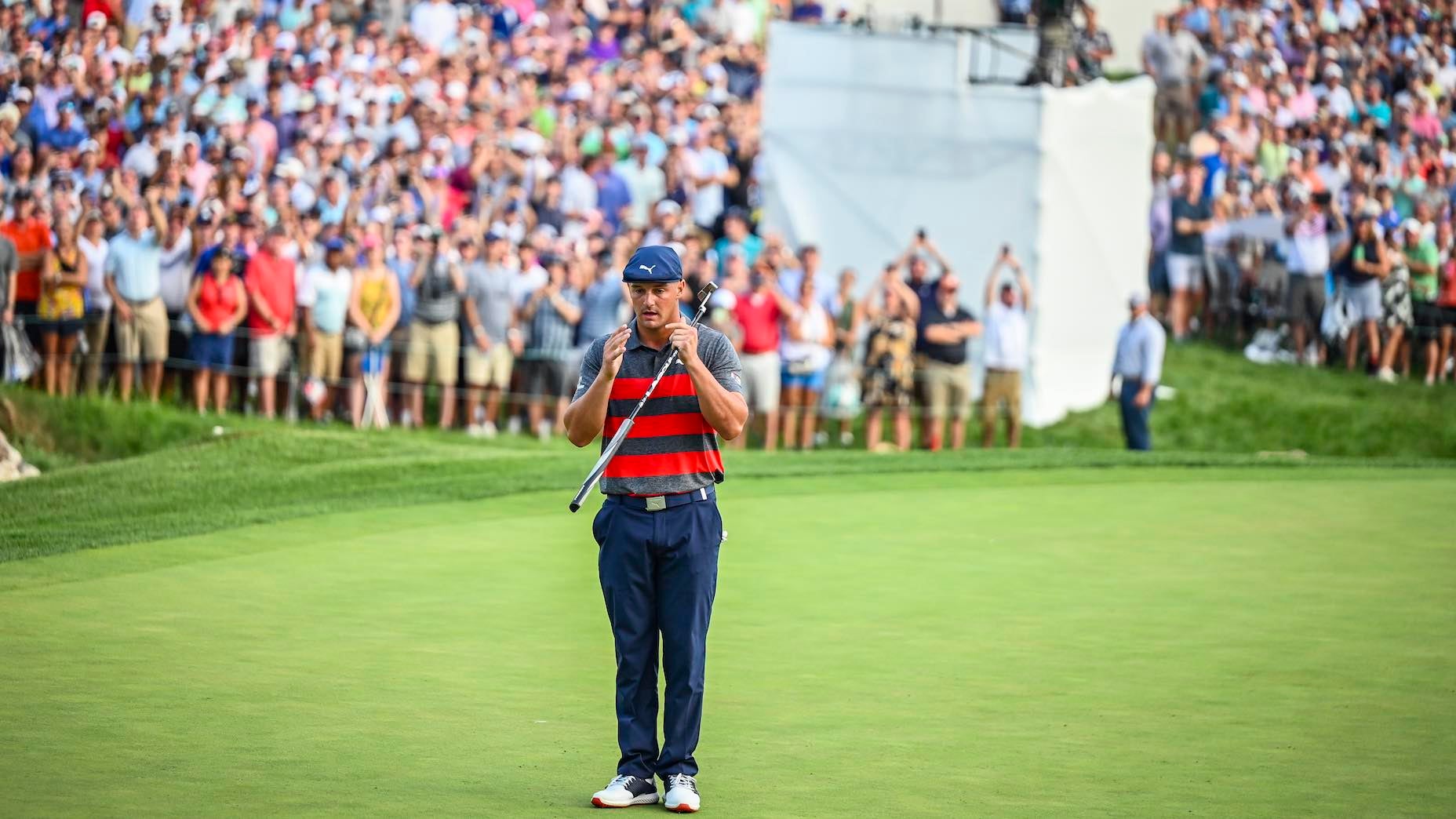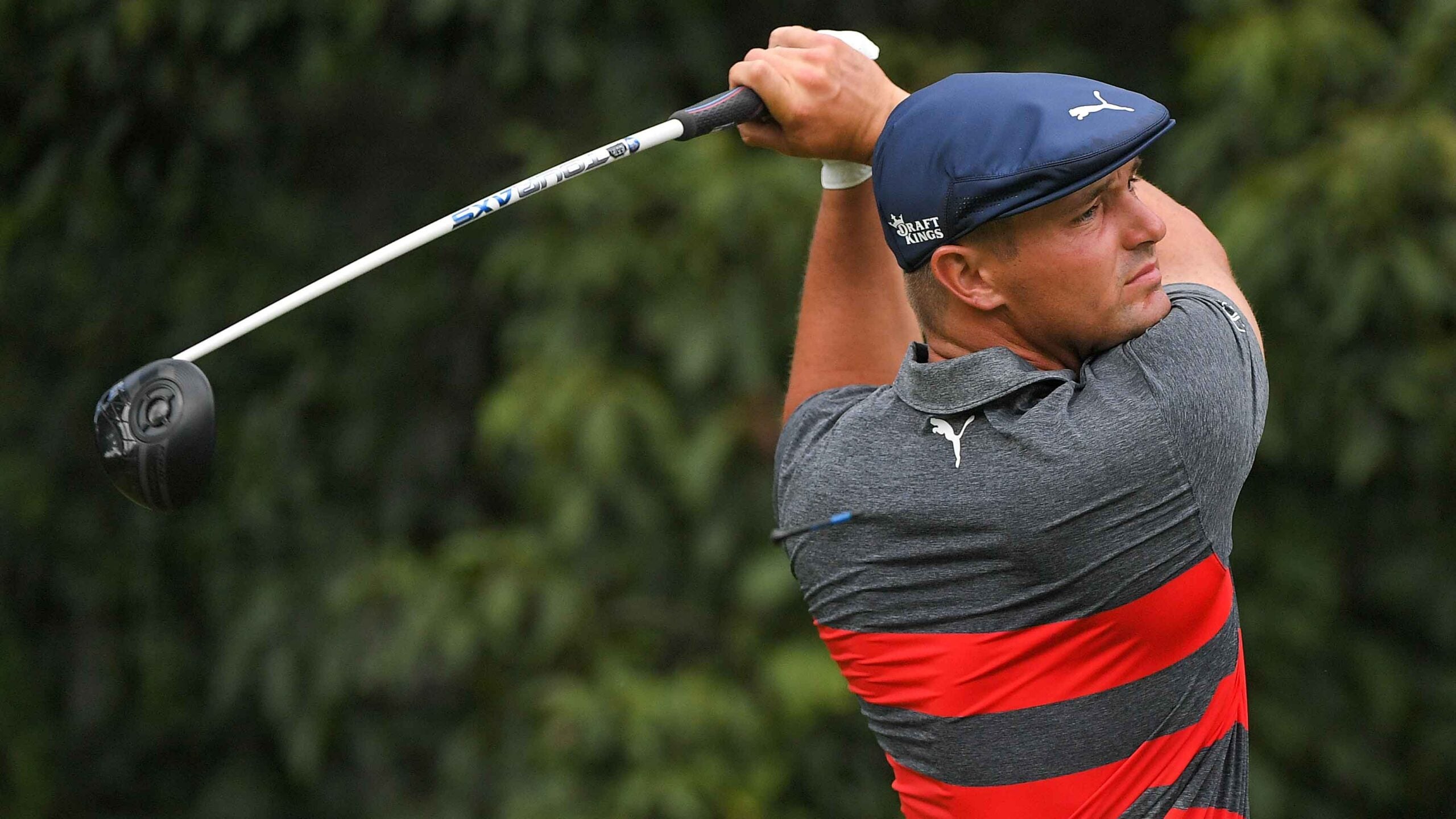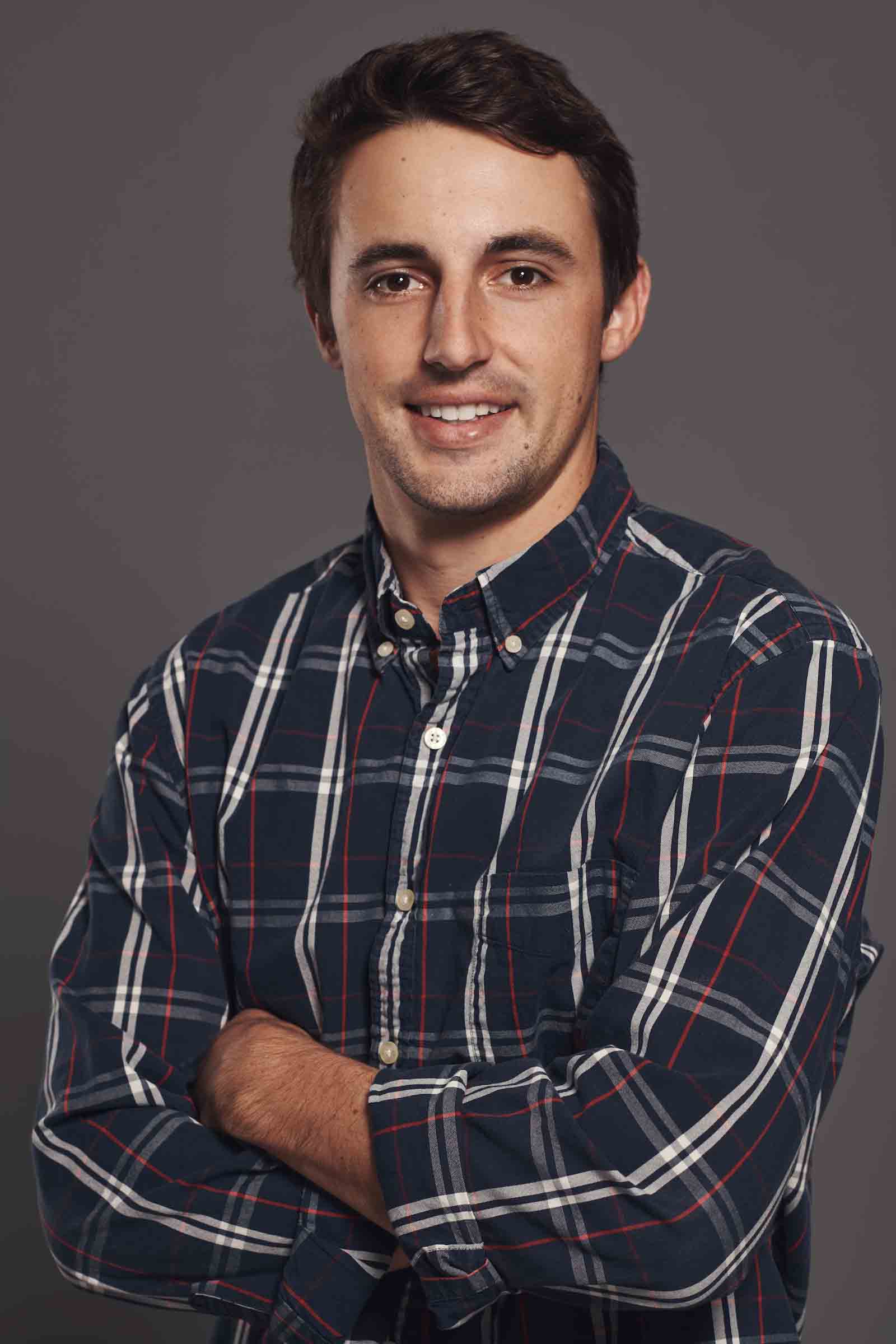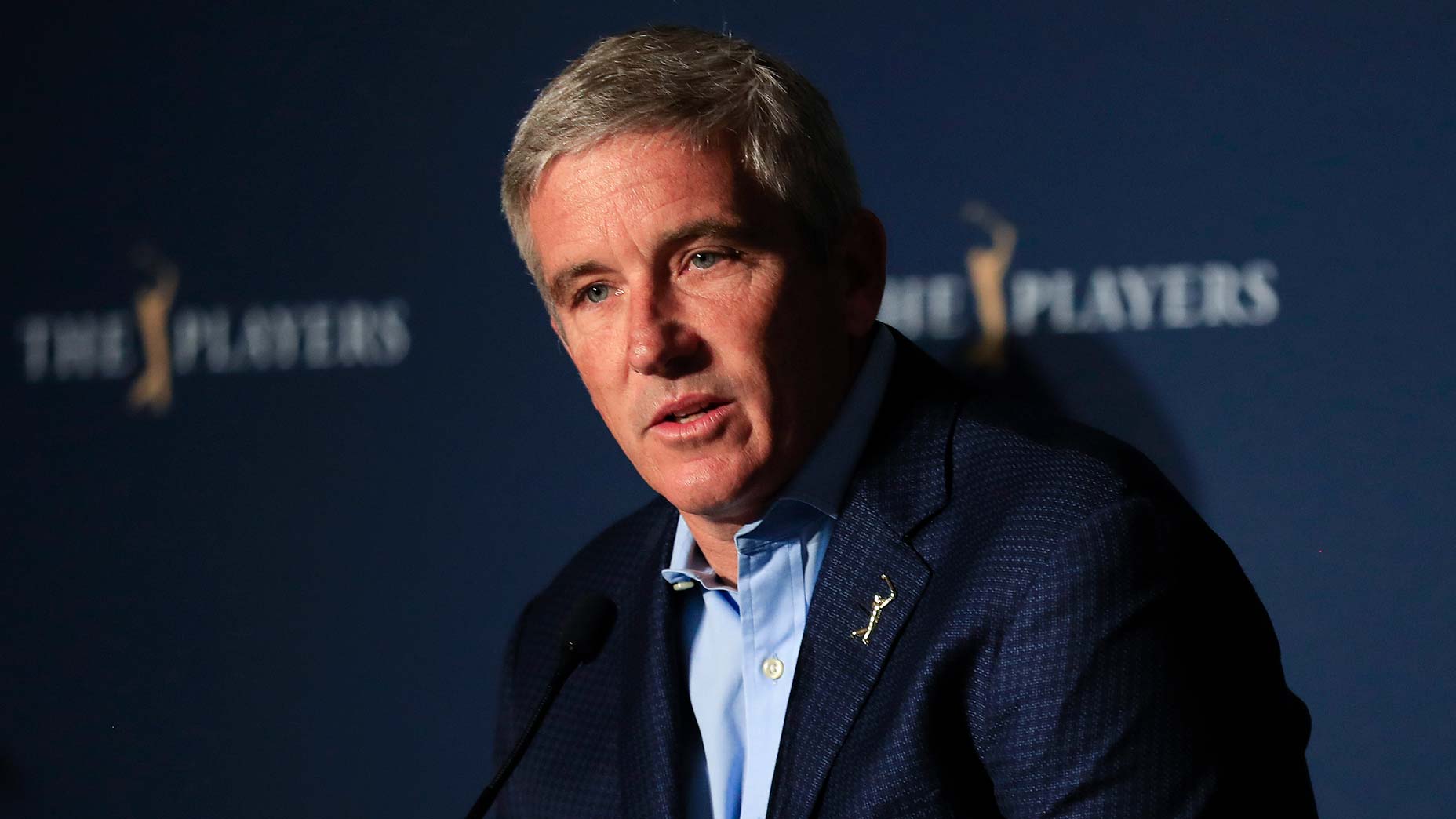
Bryson DeChambeau’s hecklers won’t be tolerated, according to PGA Tour commissioner Jay Monahan.
Getty Images
The PGA Tour has found itself in a strange position.
Fans at its events have been calling one top player by the name of another top player. And now the Tour has decided to make it stop.
You can read more on the origins of Bryson DeChambeau’s beef with Brooks Koepka in an exhaustive history here, but for our purposes let’s get to the most recent chapter, which came when fans of Koepka started heckling DeChambeau by calling him “Brooksy.” A lot of fans.
The heckling has gone on all summer, beginning in earnest at the Memorial, continuing through the U.S. Open and culminating this past weekend in a tense post-round exchange between DeChambeau and a Brooksy-shouting fan, as reported by ESPN.
On Tuesday, PGA Tour commissioner Jay Monahan met with the media and addressed the issue straightaway.
“Before I open it up to questions, I just wanted to take a minute to address a topic that’s been top of mind lately for our players, fans, and of course, for those of you in the media. I’m talking about fan behavior and the interaction with our athletes, when that behavior crosses the line and what we should all be doing to address it when it does,” he said. He avoided using DeChambeau’s name during the opening remarks, but it was clear who he was referring to.
Monahan theorized that in the aftermath of Covid-19 lockdowns and frustration, some fans have brought extra — and unwelcome — energy to tournaments.
“Golf is not immune from unfortunate and disruptive behavior, although I would say that we do have the very best fans in the world. This is about just a few bad actors,” Monahan said.
It is, of course, about more than a few bad actors. The “Brooksy” yells fill DeChambeau’s every walk from green to tee, from tee to green. The monotony of the PGA Tour means their effect piles up over time, because it’s so many hecklers between so many golf shots, day after day after day. That relentlessness clearly weighs on DeChambeau. Whether you think it’s a “problem” may depend on how you feel about DeChambeau, Koepka, heckling in sports more generally, golf’s history of politeness or something else. And whether you think it can — or should — be litigated might depend on how you feel about rules.
But Monahan made it clear: he wants Brooksy-yellers kicked out, even if their cries aren’t traditionally vulgar. He also made it clear that he thinks that’s relatively simple to enforce, as laid out in the fan code of conduct.
“We have to be intentional about our expectations for fan behavior and I believe our fan code of conduct does that,” he said. “By coming to a PGA Tour event, you’re expected to contribute to a welcoming and safe environment by refraining from and reporting any unsafe, disruptive, or harassing behavior. Comments or gestures that undermine the inclusive and welcoming nature of the game will not be tolerated, nor will any harassment of players, caddies, volunteers, officials, staff, or other spectators. Fans who breach our code of conduct are subject to expulsion from the tournament and loss of their credential or ticket.”
He then spoke even more specifically to the “Brooksy” situation.
“The barometer that we are all using is the word ‘respect,’ and to me, when you hear ‘Brooksy’ yelled or you hear any expression yelled, the question is, is that respectful or disrespectful? That has been going on for an extended period of time. To me, at this point, it’s disrespectful, and that’s kind of behavior that we’re not going to tolerate going forward.”
Monahan spoke at length about the “overall civility” he’d like to see from fans at tournaments as well as the “values of honor, integrity, and respect” he sees as central to golf’s identity.
It’s clear that as DeChambeau has skyrocketed in the public’s consciousness in recent months, he has been occupying more of Monahan’s mental energy, too. The two have spoken at length, he said, and he feels his role is to support and protect DeChambeau where he can.
In recent weeks, DeChambeau has chosen not to speak to reporters after rounds. Monahan said he sees that as a passing phase.
“Listen, Bryson is a star,” he said. “He has fascinated golf and sport fans around the world since our return to golf. He’s also a young man that’s growing and evolving, not just on the golf course, but off the golf course. And I would just say to you that I look at this as a point in time. I don’t think this is the way things are going to be for a long period of time.”
He added that in contrast to other leagues, which fine players who skip media obligations, the Tour has no intention of doing so.
“In any instance, we’re always going to focus on the player, the relationship with the player, understanding the player, trying to work with them to get to the right place and try and understand what’s going through their heads. And so a fine, I’m not sure what that is going to do for us in the long run. Ultimately we want the player presenting his best self when he’s in front of the media, when he’s in front of fans, and that’s ultimately the goal for any player that’s in a situation like that.”
It’s worth noting that kicking out hecklers isn’t a brand-new policy. Nor has the line at which said hecklers should be kicked out ever been made explicitly clear. Recall Justin Thomas and the “Get in the bunker” incident. Or the fan who was ejected at the 2020 Players for asking Patrick Reed to sign his shovel.
Players had some fun with Monahan’s quotes, including Lee Westwood and James Hahn:
Their jokes underscored the fact that no matter how simple Monahan made this sound, there’s still plenty of grey area when it comes to fan conduct and the way it’s policed. There will be inconsistencies in the way it’s enforced. There will be other players who wish they’d been similarly protected in the past. And there will be fans who see this as a challenge to yell “Brooksy” anyway.
There are questions the rule raises, too. Does any fan yelling any name at any other player get the boot? Does any fan rooting against a player get kicked out? And what happens if DeChambeau and the real “Brooksy” are actually paired together?
But then, it wouldn’t be golf if we weren’t arguing about the rules.









